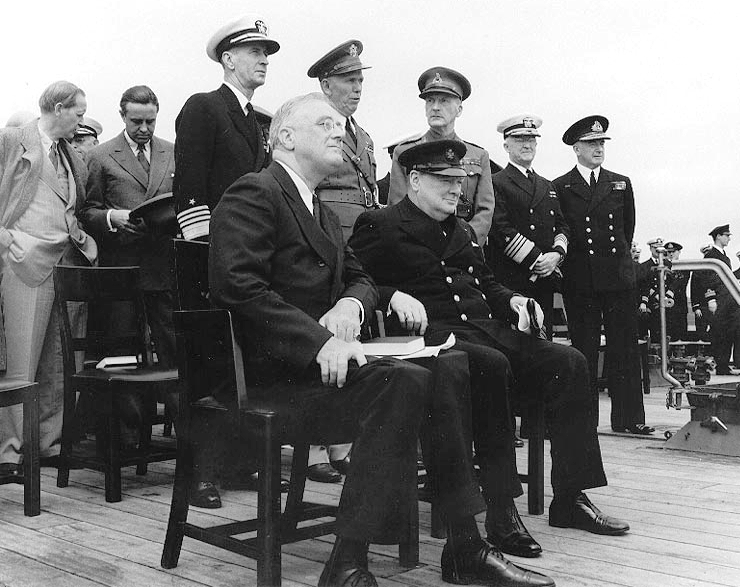It happened today - August 12, 2015
 How’s this for the Anglosphere? On August 12 of 1941, Franklin Roosevelt and Winston Churchill met on a ship in Canada to plan their joint strategy for the Second World War. (You can see a short video clip from that day, here.) They even issued a joint statement of war aims, the “Atlantic Charter”. Which shows astonishing boldness and deviousness at once, since the United States wouldn’t join the war for another four months.
How’s this for the Anglosphere? On August 12 of 1941, Franklin Roosevelt and Winston Churchill met on a ship in Canada to plan their joint strategy for the Second World War. (You can see a short video clip from that day, here.) They even issued a joint statement of war aims, the “Atlantic Charter”. Which shows astonishing boldness and deviousness at once, since the United States wouldn’t join the war for another four months.
I’m not a big FDR fan. I dislike his domestic policies, of course. And I also find the man off-putting in all sorts of ways from his nebulous political philosophy to his deviousness to his arrogance. It seems to me a highly revealing anecdote that he used to play poker with important Senators regularly (politicians had more time back then, not a bad thing) but if he lost he wrote cheques that, it was understood, would not be cashed. Even though he was richer than almost any of them.
I don’t much like his foreign policy either. It was for the most part characteristically flippant, arrogant and ill-informed. His position on Eastern Europe in 1944 and 1945, and his belief that he could manage Stalin like some rube ward politician from Kansas City, caused untold tragedy. And yet I will say, enthusiastically, that he realized early on that Hitler menaced the entire world and must be stopped.
He understood, when the chips were down, not only what Hitler was like. He knew Britain and America were part of a shared civilization. A copy of Magna Carta on loan from Britain was put safely in Fort Knox when the war broke out. And at the Argentia conference FDR and Churchill attended a church service with the two nations’ flags on the pulpit, after which British and American officers and men sang “Oh God, Our Help in Ages Past” and “Onward, Christian Soldiers.”
Roosevelt’s way of bringing his countrymen on board with his ideas and getting them into the war was characteristically devious, indirect and smug. I think he could have done more, earlier, and more honestly, and should have. (His engineering of incidents involving U-boats and the US Navy and his blatant lies about them were a model for Lyndon Johnson in the Gulf of Tonkin… and I don’t mean that in a good way.) And yet I must concede that he deployed his enormous talents in the dark arts of politics to bring about American entry into the war and though he rarely took a bold step directly in that direction, he never let up from the soft, persistent, indirect steps that led to the desired result and he did succeed.
In this respect curious “might have been” from the spring of 1941 intrigues me. By that the U.S. navy was cooperating with the British in all but name, patrolling the “Western Hemisphere” half-way across the Atlantic, reporting U-boats to the Royal Navy, and shifting battleships and carriers as well as cruisers and destroyers from the Pacific to the Atlantic. And when in May of 1941 the British were desperately hunting the German super-battleship Bismarck, the aging American battleship U.S.S. New York nearly ran into Bismarck on its way to replace U.S.S. Texas on patrol well past the supposed demarcation line of the “Western hemisphere”.
It was probably on purpose. I have no use for conspiracy theories about Pearl Harbor. But I do suspect FDR was hoping Bismarck would clash with New York and, quite possibly, sink her, giving him a casus belli against Germany which, he always understood, was more dangerous than Japan. (Despite Pearl Harbor, the U.S. always devoted more of its military effort to the European than the Pacific theatre until Germany surrendered.)
It might seem cynical to put American sailors in harm’s way in such a fashion. But FDR was a deeply cynical idealist. And much as I dislike the cynicism, I applaud without qualification his idealistic determination to get the United States into the Second World War somehow.